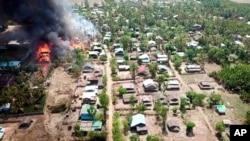The Myanmar military has killed civilians, including children, in indiscriminate bombings in the nation’s Rakhine and Chin states, Amnesty International said Wednesday.
The human rights group said it has gathered new evidence indicating several villages were bombed in the Chin State in March and April, claiming the lives of more than a dozen people.
Amnesty said the victims were mostly Buddhist, but that there were also some Christian minorities in Rakhine and Chin. It noted media reports have documented that Rohingya civilians were also targeted.
The alleged incidents occurred with conflict escalating in the states since attacks in January 2019 on several police posts in northern Rakhine by the Arakan Army, an ethnic Rakhine armed group.
“While Myanmar authorities were urging people to stay at home to help stop COVID-19, in Rakhine and Chin states its military was burning down homes and killing civilians in indiscriminate attacks that amount to war crimes,” said Amnesty International Asia-Pacific Director Nicholas Bequelin. COVID-19 is the disease caused by the coronavirus.
Vowing to “crush” the AA, the Myanmar military retaliated, leading to an escalation in violence and the displacement of tens of thousands of people, according to Amnesty.
The rights group is urging the United Nations Security Council to launch a war crimes investigation into the attacks, which occurred in townships where the internet has been cut off since June 2019.
Customary international humanitarian law considers an indiscriminate attack that results in civilian deaths a war crime.
The Myanmar government has said the blackout was necessary to prevent the AA from using mobile internet connections to coordinate attacks on officials and incite hate. Only Maungdaw has regained mobile internet access since five of the nine townships had the blackout reimposed after it was temporarily lifted in February.
Media access to Rakhine State is very limited. Foreign journalists can report from the area only after scheduling visits while accompanied by government representatives.
The U.N.’s International Court of Justice is already investigating the Myanmar government over its treatment of the Rohingya, hundreds of thousands of whom fled Rakhine after a military crackdown nearly three years ago.
The Myanmar government has said the suppression was a legitimate response to attacks by a small armed group of Rohingya fighters known as the Arakan Rohingya Salvation Army.






